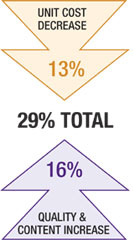Study Concludes Productivity Is Up, Just Not Enough
Construction productivity has increased 30% over the past 40 years, according to a new analysis of the issue. "But thats not good enough," concludes author Preston H. Haskell, chairman of The Haskell Co., Jacksonville, Fla. Construction still needs to boost productivity to keep pace with other industries, he believes.
 |
Haskells study challenges the often-quoted metric of Paul Teicholz, civil engineering professor emeritus from Stanford University, who found that the industrys productivity from 1964 to 1998 (as measured by constant contract dollars per field-work hour) "declined by an average of nearly 0.5% per year" (ENR 12/13/99 p. 59). In the same time period, labor productivity in other nonfarm industries increased 1.7% annually.
Haskell believes constant contract dollars do not accurately measure the tangible output of the construction industry. Based on data from his firms projects in the southeastern U.S., Haskell finds that "real unit costs in dollars per square foot for similar buildings have decreased." Looking at building types such as warehouses, retail, offices and multifamily residential, Haskell found an average 13% decrease in cost per sq ft.
He says the measure also does not consider enhancements in quality and performance of buildings over the time period. Buildings have better fire protection, seismic and wind resistance, sustainability, accessibility, security and energy efficiencyfactors that add to costs by an estimated average of 16%.
|
Haskell also studied the effect of observable increases in labor task productivity: machine excavation and trenching, power floating and troweling, concrete pumps, gang forms, power tools, computerized transits, lightweight materials and other factors. He estimates that the real cost of construction materials and the use of new lower-cost materials have led to a 25% decline in real materials costs over the past 40 years. Haskell plans to validate his analysis by expanding the research to a broader sample, but he considers the data to be "accurate" for the purposes of the broad conclusions he reaches.
Thomas Gilbane Jr., chairman & CEO of Gilbane Building Co., Providence, agrees, saying that in assessing his firms work, he also sees projects being completed faster and with higher quality.
Teicholz, who updated his 1999 study in April, cautions that the large proportion of construction done by small family-owned contractors not in a position to use capital-intensive construction methods affects broad productivity measures. He believes the overall measure of field labor productivity he used "gives a fairly accurate measure...



